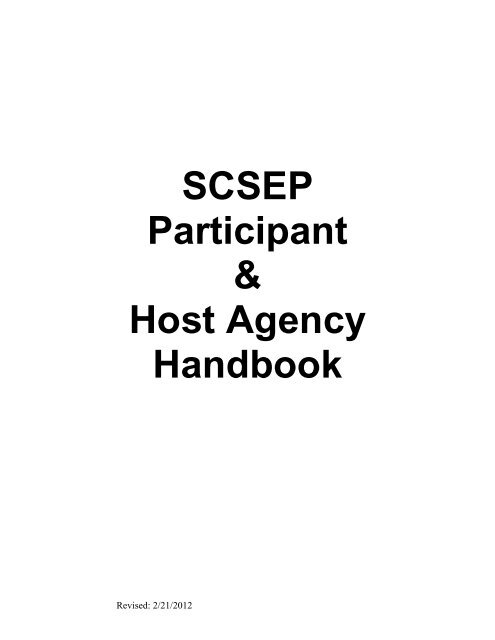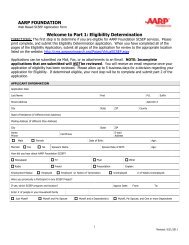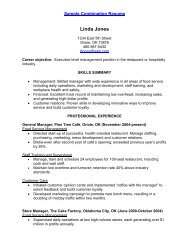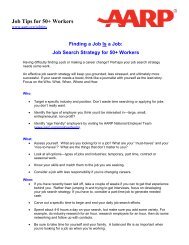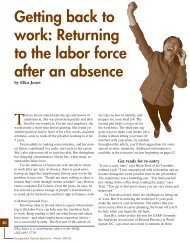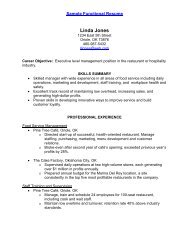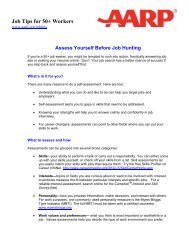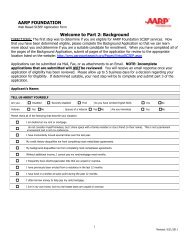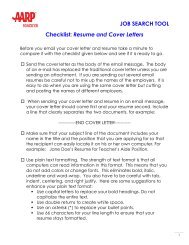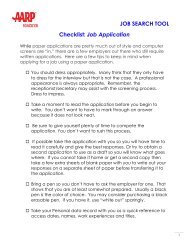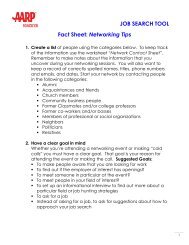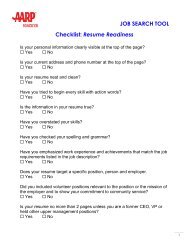SCSEP Participant & Host Agency Handbook - AARP WorkSearch
SCSEP Participant & Host Agency Handbook - AARP WorkSearch
SCSEP Participant & Host Agency Handbook - AARP WorkSearch
- No tags were found...
You also want an ePaper? Increase the reach of your titles
YUMPU automatically turns print PDFs into web optimized ePapers that Google loves.
<strong>SCSEP</strong><strong>Participant</strong>&<strong>Host</strong> <strong>Agency</strong><strong>Handbook</strong>Revised: 2/21/2012
Table of ContentsSECTION ONE: INTRODUCTION .............................................................................................. 4WHAT IS THE <strong>AARP</strong>?.............................................................................................................. 4WHAT IS THE <strong>AARP</strong> FOUNDATION?................................................................................... 4WHAT IS THE <strong>AARP</strong> FOUNDATION WORKSEARCH?...................................................... 4<strong>WorkSearch</strong> Assessment System............................................................................................ 4First Step Assessment System ................................................................................................ 5Senior Community Service Employment Program (<strong>SCSEP</strong>) ................................................. 6SECTION TWO: GETTING STARTED ....................................................................................... 9AS A PARTICIPANT................................................................................................................. 9The <strong>Participant</strong>’s Responsibilities........................................................................................... 9Program Requirements Form (Sample) ................................................................................ 11AS A HOST AGENCY SUPERVISOR................................................................................... 14Additional Responsibilities of a <strong>Host</strong> <strong>Agency</strong>...................................................................... 14<strong>Host</strong> <strong>Agency</strong> Resource Site .................................................................................................. 15Maintenance of Effort........................................................................................................... 15Benefits of Being a <strong>Host</strong> <strong>Agency</strong>.......................................................................................... 16<strong>Host</strong> <strong>Agency</strong> Agreement (Sample) ....................................................................................... 17SECTION THREE: PROGRAM SERVICES.............................................................................. 19<strong>Participant</strong> Meetings and Workshops ....................................................................................... 19The Trial Employment Program ............................................................................................... 19Intensive Services ..................................................................................................................... 19Enrollment Reviews.................................................................................................................. 20<strong>WorkSearch</strong> Information Network (WIN)................................................................................ 20SECTION FOUR: HOST AGENCY ASSIGNMENTS............................................................... 21Training Assignments ............................................................................................................... 21Training Assignment Evaluations............................................................................................. 22SECTION FIVE: SAFETY & ACCIDENT INFORMATION .................................................... 23Workers Compensation............................................................................................................. 23The <strong>AARP</strong> Foundation <strong>SCSEP</strong> Safety Program....................................................................... 23<strong>Participant</strong> Safety Review..................................................................................................... 23Initial <strong>Host</strong> <strong>Agency</strong> Agreement and Safety Review............................................................. 23Subsequent <strong>Host</strong> <strong>Agency</strong> Agreement and Safety Reviews................................................... 24Safety Videos........................................................................................................................ 24Accident Reporting ................................................................................................................... 24SECTION SIX: PAYROLL & TIMESHEETS ............................................................................ 26Blank Time & Attendance Report (Sample)............................................................................. 26<strong>Participant</strong> Payroll & Timesheet Training Video ..................................................................... 26Who Pays <strong>Participant</strong>s?............................................................................................................. 26Payroll Periods & the Payroll Cycle ......................................................................................... 27<strong>Participant</strong> Wages and Certification of Time & Attendance Reports....................................... 27Receiving & Completing the Time & Attendance Reports ...................................................... 28Correcting Errors on the Time & Attendance Reports ............................................................. 30Submitting the Time & Attendance Reports............................................................................. 30Sample of a Completed Time & Attendance Report ................................................................ 31Direct Deposit Paychecks ......................................................................................................... 32Work Hours, Overtime and Compensatory Time ..................................................................... 32<strong>Host</strong> <strong>Agency</strong> Closings............................................................................................................... 33Policy Regarding Unpaid Absences.......................................................................................... 33Revised: 2/21/2012 2
SECTION SEVEN: ADDITIONAL PROGRAM INFORMATION &....................................... 34POLICIES ___________________________________________.............................................. 34Policy Regarding Drugs in the Workplace ............................................................................... 34Policy Regarding Weapons in the Workplace .......................................................................... 34Durational Limits...................................................................................................................... 34<strong>Participant</strong> Involuntary Termination Policy.............................................................................. 361. Termination Due to No Longer Being Eligible .......................................................... 362. Termination Due to Being Incorrectly Determined Eligible...................................... 373. Termination Due to Reaching the 48-Month Maximum Participation Limitation..... 374. Termination Due to Becoming Employed During Enrollment .................................. 375. Termination for Cause ................................................................................................ 38Grievance Procedure................................................................................................................. 42Paid Holidays............................................................................................................................ 45<strong>AARP</strong> Membership................................................................................................................... 45Political Activity....................................................................................................................... 46Federal Regulations .................................................................................................................. 46Revised: 2/21/2012 3
community job market, and connections to local training and employmentopportunities at no cost to the individuals.The <strong>WorkSearch</strong> Assessment System enables self-rating and objectivemeasurement of skill strengths and weaknesses for hundreds of job roles.<strong>Participant</strong>s are analyzed based on strengths and areas for improvement relativeto a particular job role. As participants proceed through training and post trainingassessment, this system updates dynamically to show improvement and toindicate when full job skill certification status has been achieved or surpassed.<strong>Participant</strong>s engage in targeted training for the specific areas where they lack theskills required for a specific job role.Features of the toolo A customized system that provides a seamless path from personaljob interests through skills assessments, skill tests, and on linecourses.o Uses a selected system run by the National Business ServicesAlliance (NBSA), a growing consortium of eight universities with 120employer consultants who have vetted over 1200 job-specific on linecourses (Eighty are certified) that represent 75% of all job titles inthe Bureau of Labor Statistics job bank.o Registrants can access any of the features of the system as manytimes as they desire with no time limit and at no cost to them.o At any point in the process, an individual can do a local job matchbased on the assessments completed to that point, and will be takento any one of three job banks where all available jobs within 25 milesmatching the assessed interests and skills will be downloaded andprinted.o The <strong>WorkSearch</strong> Assessment System is also available in Spanish.Our goal is to provide all mature workers with an informed choice regarding theiremployment interests and options, to assist them with meeting their employmentgoals, and to help them gain increased financial security.In order to begin using the <strong>WorkSearch</strong> Assessment System, job seekers mustfirst visit a <strong>WorkSearch</strong> office to have an account created for them. Once anaccount has been completed, users can access the <strong>WorkSearch</strong> AssessmentSystem from any high-speed internet connection 24 hours per day, 7 days perweek.First Step Assessment System<strong>AARP</strong> Foundation First Step is an abbreviated version of the <strong>WorkSearch</strong>Assessment System. Job hunting is never an easy process. It can be especiallydaunting if you have not been in the job market for a long time. Two criticalactions to take as you begin your job search are to 1) assess your own interestsand skills and 2) to see what jobs might be available in your community. <strong>AARP</strong>Foundation has developed a comprehensive assessment system specific to yourRevised: 2/21/2012 5
needs. This system helps you assess your work interests and personalcharacteristics as well as your workplace and transferable skills. The system willalso help you see what jobs are currently available in your community and linkyou to the application process. The assessment process begins with the FirstStep system. This First Step system will help you zoom in on the most promisingjob openings. Do your research and you can match your job search to fields thatdemand your skills and the areas that match your interests.Senior Community Service Employment Program (<strong>SCSEP</strong>)The goal of the <strong>AARP</strong> Foundation <strong>SCSEP</strong> is to provide useful, but part-timetemporary, community service to host agencies in the community and toassist participants with updating or developing the skills they need toobtain a permanent “unsubsidized” job in their community. Our successadds directly to the economic vitality of the communities in which we workby providing a source for dedicated, trained, mature workers. A corollarybenefit is the partnerships we form with public and non-profit hostagencies that provide a short-term training environment for each of ourparticipants, and in return, receive a temporary supplement to their staff atno cost. This partnership provides our communities with millions of hoursof service annually that would not otherwise be available.All <strong>AARP</strong> Foundation <strong>SCSEP</strong> participants will also have full access to the<strong>WorkSearch</strong> Assessment and First Step Systems.In addition to the <strong>WorkSearch</strong> Assessment System, <strong>SCSEP</strong> providesopportunities for eligible individuals age 55+ to obtain new job knowledge,enhance their skills and gain a competitive edge in today’s job market. To beeligible, applicants must be financially qualified, unemployed, and must beinterested in bettering their current employment circumstances.Note: Within <strong>SCSEP</strong>, the term “enrollee” and “participant” are usedinterchangeably. “Enrollee” and “participant” are <strong>SCSEP</strong> specific terms and arenot used outside <strong>SCSEP</strong>.<strong>SCSEP</strong> Program participants are placed in temporary assignments with nonprofitcommunity organizations or with federal, state, county or city organizations,where they have an opportunity to sharpen and develop skills while searching fora permanent job. While working in their temporary training assignments,participants earn the prevailing minimum wage per hour of training they receive.<strong>Participant</strong>s also benefit from <strong>SCSEP</strong>’s “Trial Employment” opportunities whichallows employers to try <strong>SCSEP</strong> participants in their vacant positions for 2 to 4weeks at no cost to the employer.Unlike the <strong>WorkSearch</strong> Assessment System, the <strong>AARP</strong> Foundation <strong>SCSEP</strong> isfunded by a grant from the U.S. Department of Labor with support from <strong>AARP</strong>and the <strong>AARP</strong> Foundation.Revised: 2/21/2012 6
During its sponsorship of the program, <strong>AARP</strong> Foundation’s <strong>SCSEP</strong> has servedmore than 400,000 people across the country. Historically, the <strong>AARP</strong>Foundation serves approximately 23,000 low-income older workers and has thehighest job placement and service rate of any national sponsor in history.<strong>Participant</strong>s in the <strong>AARP</strong> Foundation <strong>SCSEP</strong> contribute approximately 8,000,000hours of service in local communities annually, valued at over $135,000,000.85% of our participants were still in their jobs six months after leaving ourprogram—the highest rate of any state or national sponsor.The <strong>AARP</strong> Foundation Senior Community Service Employment Program(<strong>SCSEP</strong>) manages 73 project sites in 22 states and Puerto Rico, withapproximately 10,000 participants.The success of the <strong>AARP</strong> Foundation <strong>SCSEP</strong> contributes unequivocally to theeconomic vitality of the communities. We assign our mature job seekers tosubsidized training and aid them in their search for unsubsidized jobs within theircommunity.There are two primary personnel entities that participants interact with whileenrolled in <strong>SCSEP</strong>: The Project Director <strong>Participant</strong> StaffEach are dedicated to cultivating the quality of life for mature workers bypromoting opportunities for their economic independence.The Project Director is familiar with the local job market and the job skills that arein great demand within their community. The <strong>SCSEP</strong> Project Director worksclosely with employers’ to understand the qualifications required, workenvironments and job opportunities created for mature workers.<strong>Participant</strong>s assigned to the Project Office are termed project office staff.Although the project office staff is not considered employees of the <strong>AARP</strong>Foundation, they fully comprehend both the mission of the program and therelated responsibilities that share in the success of the program’s project sites.Two-way communication and cooperation with the Project Director and projectoffice staff is critical to the success of every <strong>SCSEP</strong> participant.Our Motto:“Your Job Is To Get A Job, Our Job Is To Help You!”Revised: 2/21/2012 7
IMPORTANT PROGRAM INFORMATIONThe following information will provide you with a better understanding of yourresponsibilities as a <strong>SCSEP</strong> partner and of our responsibilities to you as aprogram. Whether you are a job seeker looking for assistance or a communityagency wishing to provide training to older workers, you must understand thetrue mission of the program. Only with this understanding and a commitment tofollow policies and procedures can the program be successful for our partners.All participants in the program are asked to sign a Program Requirements form(see sample in Section Two below) that outlines our responsibility as a sponsorand their responsibility as a participant. It is important for both participants andhost agency partners to understand the policies and responsibilities each agreesto upon enrolling in <strong>SCSEP</strong>.Limited FundingGiven that the total funding provided for all sponsors and states under Title V ofthe Older Americans Act can reach less than 1% of the eligible population, the<strong>AARP</strong> Foundation <strong>SCSEP</strong> is committed to helping as many older individuals aspossible gain the skills and confidence they need to find real employment andbetter their lives. In order to serve more individuals it is critical that we free up asmany participant slots as possible. We do this by placing participants intounsubsidized employment so that we can bring new participants into the programto replace those who have left with jobs. It also means that those participantswho fail to actively participate in their host agency training assignments and inthe unsubsidized job search process as required by the grant could be separatedto make room for new participants.Revised: 2/21/2012 8
SECTION TWO: GETTING STARTED_____________________AS A PARTICIPANTProject office staff must first determine an applicant’s eligibility for enrollment.Eligibility is based on age, residency, employment status, and income guidelinesestablished by the U.S. Department of Labor and by our ability to provide theservices you need. We may not be able to help everyone who is eligible. Onceyour application has been accepted, and your enrollment forms, which includeProgram Requirement form shown below, are completed your program servicesbegin. These services will include: Assignment to a host agency An assessment of skillsA formal program orientationThe creation of an Individual Employment Plan (IEP) that will identifybarriers to employment and recommended assignments, training andservices to overcome these barriers.Assistance with setting employment goalsReferrals to employment opportunitiesFollow-up meetings, evaluations and reviews to determine your progressand “next steps” in your enrollmentObtaining assistance from other programs (e.g., disability and agingprograms and veterans groups)The <strong>Participant</strong>’s ResponsibilitiesAs a participant on the program, it is important that you communicate youractivities, concerns, progress and goals to the project office staff. It is only withthis open communication that we can fully assist you with realizing youremployment goals.This communication should include, but is not limited to:1. When you are unable to report to your host agency as scheduled, you willcontact both the Project Office and your host agency supervisor in a timelymanner.2. You will notify the Project Office before making any changes to yourscheduled work hours at your assignment.3. You are only authorized to work your scheduled/approved hours.4. You will tell your host agency supervisor of your employment goals andrequest his or her assistance with locating a permanent job. This includesapplying for appropriate jobs available at the agency and requesting awritten recommendation.5. When you apply for a job or go on an interview, you will contact the ProjectOffice so your job search efforts can be noted in your file.6. You will register with the State Employment Service or One-Stop and willnotify the Project Office when this has been completed.7. You will notify the Project Office immediately if there are changes to yourincome or family size. Changes to personal information such as address,Revised: 2/21/2012 9
telephone number or marital status must also be communicated to theoffice in a timely manner.8. If you encounter problems with your training assignment, duties,supervisors, co-workers or staff, you will report these issues to the ProjectDirector in a timely manner so the issues can be resolved.9. If you are injured or become ill while at your assignment, you will reportthese issues to the Project Director in a timely manner so the issues canbe resolved.10.Most importantly, when you accept permanent employment off theprogram, you will notify the Project Office immediately. This helps tosupport program goals and continued funding for others11.Some agencies may require certain background checks and screening onparticipants. The results could affect a participant’s assignment to a particularhost agency.Revised: 2/21/2012 10
Program Requirements Form (Sample)<strong>SCSEP</strong> PROGRAM REQUIREMENTSThe purpose of the <strong>SCSEP</strong> is to provide part-time training while I actively work tofind a job off of the program. This is not a permanent job. This program does nothave the funding to serve everyone who is eligible, and this program does nothave the ability to serve those with no reliable transportation or those who do notwish to find a job off the program. (Initial _____)If I am determined eligible and enroll and/or when I get a job off the program, Iunderstand that I may lose all or part of those public benefits I now receive.These benefits may include: Public Housing, Food Stamps, SSI/SSD, Medicaid,and Unemployment.(1) I acknowledge that if I am found eligible and enroll and/or when I findunsubsidized employment that I may lose all or part of the benefits noted above.(Initial ______)(2) I agree—even if I may lose benefits—that if I am enrolled I will cooperate withthe Project Director/staff by: accepting referrals and interviews for unsubsidized jobs (Initial _____) conducting an ongoing search for unsubsidized employment as specifiedin my IEP and as directed by the Project Director and/or project site staff(Initial___) accepting regular transfers of my host agency assignments as necessaryto further my training and work experience (Initial_____) maintaining registration with the State Employment Service and/or OneStop Center (Initial _____) attending job search training, job clubs, participant meeting, etc., whenrequired by the Project Office, and to engage in continuing unsubsidizedjob search activities. (Initial_____)(3) <strong>SCSEP</strong> is a short-term, work-training program usually lasting months, notyears, which helps to prepare participants for unsubsidized employment. <strong>SCSEP</strong>participants are considered to be in temporary, training status, preparing toaccept unsubsidized employment off of the program. The program is not anentitlement, nor is it designed to provide income maintenance. I acknowledgethat training with the host agency is NOT a job and if I am enrolled I am not anemployee of either the <strong>AARP</strong> Foundation or the host agency to which I amassigned. (Initial___)(4) The Project Director may change my enrollment status or terminate my worktraining host agency assignment at any time. <strong>Participant</strong>s complete a skillsassessment and an Individual Employment Plan (IEP) upon enrollment. Basedon the needs identified in my (IEP) and the skills I possess, AND based on theneeds of the <strong>AARP</strong> Foundation <strong>SCSEP</strong>, I could be transferred from one worktrainingassignment to another to broaden my experience and better prepare mefor an unsubsidized job off of this program or to make adjustments to theRevised: 2/21/2012 11
program as required by funding. The number of transfers, length of trainingassignments, and the location of my assignment are based on my place andprogress in the program AND the needs of the program for ongoing support. Ishould not compare my progress, transfers, and tenure on the program withanyone else. (Initial______)(5) <strong>AARP</strong> Foundation reserves the right to set participant training hours based onthe budget available and other program considerations in the county where theparticipant is assigned. This may result in cases where less than 20 hours perweek is available. (Initial______)(6) Do you own a vehicle? If yes, my initials attest to having both a valid driverslicense and valid auto insurance. (Initial______)(7) At the time of participation, I am not employed, i.e.: I do not do any work at all as a paid employee. (Initial______) I do not do any work at all in my own business, profession, or farm.(Initial______) I do not work 15 hours or more as an unpaid worker in an enterprise operated bya member of my family. (Initial______) I do not have a job or business from which I was temporarily absent because ofillness, bad weather, vacation, labor-management dispute, or personal reasons.(Initial______)(8) I may not volunteer time at my Training Assignment, and I will not be paid forany time that was not authorized or that was performed outside of my worktrainingschedule. In addition, the Training Provider may request my removalanytime my behavior, attendance, attitude, or aptitude proves detrimental to theagency or <strong>SCSEP</strong>. (Initial_____)(9) <strong>AARP</strong> Foundation <strong>SCSEP</strong> may change participant benefits and guidelines atany time, and reduce my hours if necessary due to budgetary constraints.(Initial_____)(10) My enrollment in the <strong>SCSEP</strong> is based on a number of things, including mycontinuing eligibility, satisfactory performance of my work-training assignments;suitable transportation that allows me to accept training and an unsubsidized jobat locations throughout my community; and my willingness to actively cooperatein the job search process as spelled out in my IEP and directed by the ProjectDirector and/or project site staff. If information I provided to meet the program’seligibility is inaccurate I may be subject to immediate dismissal. (Initial_____)(11) I understand that enrollment in the <strong>SCSEP</strong> is normally months, not years.Under most circumstances a participant will have taken advantage of all theresources & services in this program after two or three training assignments andshould be well on his or her way to finding unsubsidized employment off theRevised: 2/21/2012 12
program. Given <strong>AARP</strong> Foundation <strong>SCSEP</strong>’s limited funding and the number ofeligible individuals who need our help, <strong>AARP</strong> Foundation <strong>SCSEP</strong> cannot keepindividuals on the program who have exhausted all our resources. (Initial_____ )(12) While not a condition of enrollment, it is expected that participants willmaintain a bank account and utilize the program’s direct deposit service.(Initial_____)(13) I agree to provide <strong>SCSEP</strong> all my employment information, once I havesecured an unsubsidized job, no matter how the job was obtained. (Initial _____)(14) I agree to allow the release of information about my enrollment,assignments, employment status and wages while enrolled or for up to a yearafter leaving the program for reporting or program promotion purposes.(Initial___)(15) I understand that as part of my enrollment I may be asked to complete aCustomer Satisfaction Survey. I agree I will complete this survey and submit it ina timely manner if asked. (Initial _____)(16) As part of my enrollment, I may be asked/directed to attend meetings,conduct job searches or come into the Project Office. Because of our limitedresources, the Project Site is not responsible for payment for mileage ortransportation to such meetings. (Initial_____)(17) Your application/enrollment process is not complete until you havecompleted your first day of training at your new training assignment. You will notbe paid for any part of the application or enrollment process unless and until youhave completed this first day of training. You will then be paid for all time spentpreviously during the application/enrollment process. (Initial_____)By signing this document, I acknowledge my understanding of the purposes ofthis program. If the program has vacancies, if I am found eligible, and if theprogram has the ability to meet my needs, I will be enrolled. If enrolled, I willreceive the <strong>Participant</strong> & <strong>Host</strong> <strong>Agency</strong> Supervisor <strong>Handbook</strong> and orientation tothe <strong>SCSEP</strong>. I will be provided with a copy of the Training Assignment Descriptionfor my training assignment. If enrolled, by signing I agree to comply with allpolicies and procedures of the <strong>SCSEP</strong>. I further understand that failure to complywith the terms of this agreement at any time during my time on the program couldput my enrollment at risk and may result in my separation from the program.<strong>Participant</strong> _____________________ Date_________________________Project Director__________________ Date_________________________Revised: 2/21/2012 13
AS A HOST AGENCY SUPERVISORProject office staff will further explain <strong>SCSEP</strong> and its mission and determine ifyour agency qualifies to serve as a training site. Federal Regulations require thatall <strong>SCSEP</strong> host agencies be either 501(c)(3) non-profit organizations or publicagencies. Proof of nonprofit status (a 501(c)(3) letter or IRS 990) if applicable,and your Federal Employer Identification Number (FEIN) will need to be providedto the Project Site Office, and will be kept on file at the <strong>AARP</strong> Foundation <strong>SCSEP</strong>Project Office. Staff will seek your input on determining what trainingopportunities might be available at your agency and will work with you to developidentify the responsibilities for these training positions.Once qualified, an official representative of your agency should be designated tosign the <strong>Host</strong> <strong>Agency</strong> Agreement (see sample below). This individual should alsodetermine who would be directly supervising the participants assigned to theagency. These supervisors must also sign the <strong>Host</strong> <strong>Agency</strong> Agreementauthorizing them to sign participants’ Time & Attendance Reports. <strong>Participant</strong>sshould not be given a blank Time & Attendance Report or complete their ownTime & Attendance reports. It is the Supervisor’s responsibility to fill in the dailyhours and the total number of hours worked. The participant should verify thosehours and then sign and date the timesheet along with the supervisor. In order tobecome a host agency, the organization must have a fax machine in goodworking order in order to both receive and send participant Time & AttendanceReports from and to the Project Site office’s payroll system at 1-866-949-1389.All paperwork must be on file in the <strong>SCSEP</strong> office before a participant may begintraining. In order to ensure that your agency continues to provide viable trainingopportunities for our participants, your participation as a host agency will beevaluated each year. At that time, you will be asked to renew the new <strong>Host</strong><strong>Agency</strong> Agreement indicating that you continue to support the mission of theprogram. If, during this annual review, it is determined that the host agency is notfulfilling its obligation to adequately train, supervise and guide the participanttoward securing permanent employment, the <strong>SCSEP</strong> may discontinue itsagreement with the agency and participants will be re-assigned.Additional Responsibilities of a <strong>Host</strong> <strong>Agency</strong>Prior to committing your agency to become a training site for <strong>SCSEP</strong>participants, you should understand and agree to the following: The host agency will bear the cost for training materials,background/security/police checks and/or health screenings required bythe agency. The host agency will provide a safety orientation to all assignedparticipants. The host agency will inform the Project Site office of any changes to aparticipant’s work schedule or training responsibilities.Revised: 2/21/2012 14
The host agency will notify the Project Office if the participant’s Supervisoris compensated with Federal Funds by checking the appropriate box onthe <strong>Host</strong> <strong>Agency</strong> Agreement.The host agency agrees to consider qualified <strong>SCSEP</strong> participants forpermanent positions within the <strong>Agency</strong> when and if they become available.<strong>AARP</strong> Foundation reserves the right to set participant training hours basedon the budget available and other program considerations in the countywhere the participant is assigned.<strong>Host</strong> agencies will ensure that participants are not unsupervised or leftalone. In the event that a participant must be unexpectedly left alone for ashort period, then the host agency should immediately notify the ProjectSite Office.<strong>Host</strong> <strong>Agency</strong> Resource SiteThe <strong>Host</strong> <strong>Agency</strong> Resource Site offers a variety of resources and information thatcan assist the <strong>Host</strong> <strong>Agency</strong> Supervisor in performing their responsibilitiessuccessfully.http://www.aarpworksearchha.orgMaintenance of EffortVery Important, Please Note: It is illegal for <strong>SCSEP</strong> participants to substitute for agency staff positionseither directly or indirectly. Federal funds may not be used as a substitutefor local funds. <strong>SCSEP</strong> is intended to be a “job creation” program meaninghost agencies must create jobs specifically for <strong>SCSEP</strong> participants, not fillexisting positions with <strong>SCSEP</strong> participants. <strong>AARP</strong> Foundation <strong>SCSEP</strong> participants must not reduce the number ofemployment opportunities or vacancies that would otherwise be availableto individuals who are not <strong>SCSEP</strong> participants. <strong>Participant</strong> training positions may not replace or fill vacant positions withinthe host agency. <strong>SCSEP</strong> participants must be assigned to “non-staff”status positions in the host agency and be considered temporary extrahelp. <strong>AARP</strong> Foundation <strong>SCSEP</strong> must not influence the displacement ofcurrently employed workers, including partial displacement, such asreduction in hours of non-overtime work, wages or employment benefits.<strong>Participant</strong>s may not be assigned to complete the same or substantiallysimilar work performed by any other person who has been laid off from thehost agency. <strong>AARP</strong> Foundation project site offices may not assign or continue to assigna participant to perform the same work or substantially the same work asthat performed by any other individual who is on layoff.Revised: 2/21/2012 15
<strong>AARP</strong> Foundation <strong>SCSEP</strong> participants may not impair existing contracts orresult in the substitution of federal funds for other funds in connection withwork that would otherwise be performed.The host agency must be able to operate independently of occurrenceswhen one or more participant(s) is/are assigned to a training position. Ifthere is an indication that this policy is being violated in any way, allparticipants currently assigned to the agency must be re-assigned and thehost agency agreement terminated. <strong>Participant</strong>s may not be paid asupplemental per hour wage by the host agency (in addition to <strong>SCSEP</strong>wages) for the purpose of increasing the participant’s hourly wage.Benefits of Being a <strong>Host</strong> <strong>Agency</strong><strong>SCSEP</strong> can provide your organization with the temporary additional manpowernecessary to strengthen the programs and services you provide to thecommunity. Many of our host agency supervisors have found that they are ableto delegate work assignments and complete priority tasks more effectively byhaving one of our participants train at their agency.Upon enrollment and to determine the best training opportunity, the project officestaff assesses the skills and abilities of each participant. This allows the staff tomake the most appropriate assignment that will allow the participant to focus onthose skills that will support his or her employment goals and it allows youragency to work with an individual who has an aptitude for the tasks involved inthe training assignment. This could mean that you may not always have aparticipant assigned to your agency even though you have a signed agreementwith the program.The project office staff will monitor the participant’s progress in the assignmentand will assist you with evaluating the participant’s performance. Because we areeager to have participants gain as much experience as possible during their shortenrollment with us, all participants should expect regular reassignments toanother host agency to ensure they are given every opportunity to broaden skillsand gain the breadth of work experience necessary to compete for qualityunsubsidized employment in the community.However, many of our host agency supervisors have also found that aspermanent jobs become available at the agency, they are able to fill the positionswith trained <strong>SCSEP</strong> participants, already well versed in the mission of theagency, rather than starting over with untrained or unfamiliar job applicants.Revised: 2/21/2012 16
<strong>Host</strong> <strong>Agency</strong> Agreement (Sample)<strong>Host</strong> <strong>Agency</strong>: _______________________________________________Address: __________________________________________________Phone: ______________________ FEIN #: ______________________Fax: ______________________________The above named agency/organization, as equal employment opportunityemployer, requests the services of participants from the <strong>AARP</strong> FoundationSenior Community Service Employment Program.This agency is:____ A Non-Profit Organization(Tax exempt under the IRS code 501 (c)(3)____ A Public Organization<strong>Participant</strong> Supervisors are:____ Compensated with federal funds____ Not compensated with federal fundsTo ensure our host agency partners understand their important role inthe daily lives of our participants and their responsibilities insupporting each participant’s quest for an unsubsidized job, we askthat each host agency supervisor clearly understand and support thefollowing requirements that are part of each participant’s agreementwith our program.1. The purpose of the <strong>SCSEP</strong> is for a participant to provide community servicewhile they actively pursue unsubsidized employment off the program. When anindividual enrolls and/or gets a job off the program they may lose their publicbenefits. These benefits may include, but are not limited to: Public Housing, FoodStamps, SSI/SSD, and Medicaid.2. <strong>Participant</strong>s are asked to cooperate with the Project Director and EmploymentSpecialists by:Accepting referrals and interviews for employment outside the program; conducting anongoing search for unsubsidized employment as specified in their IEP and as directedby the Project Director and/or project office staff; accepting regular transfers to otherhost agency assignments as necessary to further their training and work experience;maintaining registration with the State Employment Service and/or One Stop Center;attending job search training, job clubs, participant meetings, etc., when offered by theProject Office, and to engage in continuing unsubsidized job search activities. Note:these activities may cause the participant to miss some hours at their host agencyassignment3. The Senior Community Service Employment Program (<strong>SCSEP</strong>) is a short-termwork-training program to prepare participants for unsubsidized employment off ofthe program. The program is not an entitlement, nor is it designed to provideincome maintenance. <strong>SCSEP</strong> participants are considered to be in training status,preparing to accept unsubsidized employment. They, and you as the host agencyRevised: 2/21/2012 17
supervisor, must understand and accept that training with the host agency is ashort-term training opportunity, NOT a job, and that participants are NOTemployees of either the <strong>AARP</strong> Foundation or the host agency to which they aretemporarily assigned.4. <strong>Host</strong> agencies must not use participants as substitutes for permanentemployees in their agency. Federal regulations prohibit this violation of“maintenance of effort.” <strong>Host</strong> agencies must not substitute federal dollars for localdollars. <strong>Participant</strong>s are additions to, not substitutes for, regular agency staff.5. <strong>Host</strong> agencies agree to give serious consideration for any permanent jobopenings in the agency to qualified participants. This includes any outsidereferrals.6. <strong>Host</strong> agencies understand that <strong>AARP</strong> Foundation’s <strong>SCSEP</strong> does not conductbackground checks or drug screenings on participants.This host agency agrees to provide supervision, training, and a safe work site foreach assigned participant. The host agency also agrees to the provisionsoutlined in the <strong>Participant</strong> - <strong>Host</strong> <strong>Agency</strong> <strong>Handbook</strong> provided by the program as acondition of participation in the Senior Community Service Employment Program.The Department of Labor (DOL) now requires a survey of randomly selected hostagencies. This survey is generally done in January. If selected, please completethe survey as it influences continued DOL funding for this grant. In addition, beadvised that the DOL will make three attempts to get a completed survey fromyou.Workers Compensation costs for our participants continues to sky rocket as aresult of post 9-11 insurance increases and escalating costs of health care. Ourworkers comp claims are directly related to the work place environment andattitudes toward work place safety in our host agencies. We expect you tomaintain high standards and to closely monitor the activities of the participantsassigned to ensure they do not engage in activities which could cause them to beinjured. Repeated accidents that are the result of inadequate host agency safetyawareness and supervision could be cause for us to remove all participants fromyour host agency.Main Contact ______________________ Date ___________________Supervisor ________________________ Date ___________________Project Director ____________________ Date ___________________Revised: 2/21/2012 18
SECTION THREE: PROGRAM SERVICES_________________The <strong>AARP</strong> Foundation <strong>SCSEP</strong> offers a number of program services to itsparticipants to provide them with the tools, information and training they need tobe successful in getting and keeping a permanent job. Upon enrollment, allparticipants are provided with a formal program orientation that provides themwith information on topics such as: policy of no overtime or compensatory leave,pay periods and paydays, Time & Attendance Reports, project office staff,holidays, safety procedures and accident reporting, grievance procedures,participant meetings, limitations on political activities, evaluations, and policy ofseparation for inactivity.<strong>Participant</strong> Meetings and WorkshopsPeriodically, the Project Director may hold meetings or workshops to provideparticipants with training or information on job searching, employment trends andopportunities or information relevant to older workers. Attendance at meetings orworkshops is mandatory for participants as directed by the Project Director.• <strong>Participant</strong>s must notify the Project Director in advance if unable to attendthe meeting. (Only emergency situations will be a valid reason for notattending.)• <strong>Participant</strong>s report to the meeting location instead of to their host agencyfor that day but are paid for hours attending the meetings.• <strong>Host</strong> agencies must be fully supportive of the participant’s absence toattend such meetings or workshops. The Project Office will make everyeffort to inform host agency supervisors of scheduled meetings and relatedparticipant absences.The Trial Employment ProgramThe project office staff work hard to develop relationships with businesses andorganizations in the community and be seen as a staffing resource to employers.In an effort to further our standing in this area, the program is able to offeremployers, both private and non-profit, a short-term opportunity to work with/traina participant to determine if the participant’s skills and experience match well withthose required for an available position. Further information regarding this TrialEmployment program can be obtained from the Project Director.Intensive ServicesAs an added program benefit, a participant may be assigned to participate in theprogram’s Intensive Services assignment. During this time, the participant will beassigned to work directly with the Project Director and project office staff tocomplete job development activities including, but not limited to, resumepreparation, interviewing for prospective jobs, attending job clubs, updating theRevised: 2/21/2012 19
Assessment and IEP, etc. Following the Intensive Services assignment, theProject Director will make recommendations on the most appropriate next step inthe individual’s enrollment which may be accepting an unsubsidized job,returning to the same assignment as the participant had prior to taking part inIntensive Services, transferring to a new assignment for additional training,entering a Specialized Training or Trial Employment assignment, or separatingfrom the <strong>SCSEP</strong>. Workers Compensation covers participants assigned toIntensive Services. If the participant will be driving as part of their IntensiveServices, the participant must have liability insurance and a copy of thisinsurance in their file. <strong>AARP</strong> Foundation <strong>SCSEP</strong> does not reimburse participantsin Intensive Services for mileage incurred.Enrollment ReviewsIn the rare instances that a participant remains on the program for one year orlonger or if the Project Director believes that a participant’s progress towardmeeting his or her employment goals has stalled, the program is required toconduct a series of updates to the participant’s personnel file to ensure eligibilityfor continued enrollment. These updates may include:• A re-certification of the participant’s income to determine that he or she isstill income eligible to participate in the <strong>SCSEP</strong>.• An update to the participant’s Individual Employment Plan (IEP) todetermine if previous goals set are still appropriate and to identifyadditional actions that need to be taken to support current goals.• Following these updates, the Project Director may formally endorse theparticipant’s continued participation in the program and will identify “nextsteps” in the individual’s progress which may include:1. returning to his or her current assignment2. being reassigned to another agency for further training3. or taking part in the program’s Specialized Training, OJE, orIntensive Services assignment. If the Project Director determines that the participant is no longer eligiblefor <strong>SCSEP</strong> or the participant’s behavior or performance warrantstermination, alternative services will be discussed and the terminationprocess will begin.<strong>WorkSearch</strong> Information Network (WIN)<strong>WorkSearch</strong> Information Network is a great online employment guide that coversthe entire job search process from start to finish. The site provides resume helps,job searching techniques, a 5-step Starter Kit for job seekers, career assessmenttools, education and training information, success stories, and so much more.Click here to view W.I.N. aarpworkSearch.org.Revised: 2/21/2012 20
SECTION FOUR: HOST AGENCY ASSIGNMENTS___________The information provided through assessing a participant’s past experience, currentinterests, training needs, and employment goals assists the project office staff indetermining the most appropriate host agency assignment for a participant.Very Important Information About Assignments and Transfers1. An assignment must not be confused with a permanent job. A permanent job, or“placement”, occurs when participants are paid by an employer and no longersubsidized by the <strong>AARP</strong> Foundation <strong>SCSEP</strong>.2. The length of any assignment is determined by many factors. A participant maybe assigned to an agency until hired by that agency, hired by another employer,transferred to another host agency assignment, or otherwise separated from theprogram.3. <strong>Participant</strong>s may not be assigned to a host agency in which any member of his orher immediate family is employed in an administrative capacity and/or serves asa Supervisor to that participant.4. <strong>Participant</strong>s may not perform their work-training from their or any otherparticipant’s. (Excluded for OJE assignments)5. <strong>AARP</strong> Foundation <strong>SCSEP</strong> does not conduct background checks or drugscreenings on any participants. <strong>Host</strong> agencies are permitted to conductbackground checks and drug screenings for participants assigned to theirorganization. <strong>AARP</strong> Foundation <strong>SCSEP</strong> is not financially responsible for anycosts involved in any background checks or drug screening.6. The host agency or the participant can request a transfer to a different hostagency. In addition, the Project Director reserves the right to transfer theparticipants to another assignment at any time.7. When the host agency requests a participant be transferred, the Project Directorwill request further documentation to better help the participant succeed with theirnext assignment.8. When a participant separates from the program, it may not always be possible togive the agency prior notice and it may not be possible to replace the participantwith another participant. The Project Office will make every effort to keep the hostagency personnel informed of changes.Training Assignments1. <strong>Participant</strong>s must only perform those duties that they were assigned.2. A participant may drive a vehicle belonging to the host agency if it has beenapproved by the Project Director, and is covered by the host agency insuranceRevised: 2/21/2012 21
with a copy of the coverage on file in the <strong>AARP</strong> Foundation <strong>SCSEP</strong> office.However, participants may not transport passengers as part of their host agencyassignment under any circumstances.3. <strong>Participant</strong>s may not drive their own vehicles during the course of performingtheir host agency assignments.Very Important, Please NoteContinued or deliberate failure to comply with these responsibilities may result indisciplinary procedures up to and including separation from the program for theparticipant and/or discontinuing the partnership with the host agency.Training Assignment EvaluationsPeriodically, the host agency supervisor will be asked to give a verbal evaluation on theparticipant’s work performance and provide comments on areas in which the participantis performing well and guidance on areas in which the participant could improve. Theresulting feedback and discussions the supervisor has with the participant is invaluablefor the participant to develop those skills necessary to get and keep a permanent job.Revised: 2/21/2012 22
SECTION FIVE: SAFETY & ACCIDENT INFORMATION_______The <strong>AARP</strong> Foundation <strong>SCSEP</strong> holds the safety, welfare, and health of its project officestaff and participants in the highest regard. No task is so urgent that it cannot be donesafely. By agreeing to supervise participants, host agencies are also agreeing to providea safety orientation and to provide the participant with the proper information, tools andworking environment to safely perform their assigned tasks. By enrolling in the program,participants are agreeing to exercise maximum care and good judgment in preventingaccidents.Workers Compensation<strong>Host</strong> Agencies do not pay Workers’ Compensation costs for participants. Allparticipants are covered under the <strong>AARP</strong> Foundation <strong>SCSEP</strong> WorkersCompensation Insurance carrier during their assigned hours and while performing theirassigned tasks. To ensure continued coverage, it is very important that participantsand/or supervisors communicate changes to job duties or scheduled hours to theproject office staff immediately. <strong>Participant</strong>s who volunteer and work over time are notcovered under Workers Compensation. (Note: <strong>Participant</strong>s are not permitted tovolunteer to do the same work they perform during their normal work hours.)The <strong>AARP</strong> Foundation <strong>SCSEP</strong> Safety Program<strong>Participant</strong> Safety Review• The <strong>Host</strong> <strong>Agency</strong> Safety Review is a part of the <strong>Host</strong> <strong>Agency</strong> Agreement.• Prior to starting their first assignment all participants must:o View the <strong>Participant</strong> safety videoo Receive & Review the <strong>Participant</strong> Safety Review• As part of their IEP reviews & updates, all participants must receive and review the<strong>Participant</strong> Safety Review in the unlikely event that they are at the same assignmentfor more than 1-year.• <strong>Participant</strong>s should report any unsafe conditions, equipment, or practices to theirhost agency supervisor and the Project Director or project office staff.Initial <strong>Host</strong> <strong>Agency</strong> Agreement and Safety Review• The <strong>Host</strong> <strong>Agency</strong> Safety Review is a part of the <strong>Host</strong> <strong>Agency</strong> Agreement.• The <strong>Host</strong> <strong>Agency</strong> Agreement and Safety Review must be completed before the firstparticipant may begin their assignment.• When an organization is initially established as a <strong>Host</strong> <strong>Agency</strong>, the initial <strong>Host</strong><strong>Agency</strong> Agreement and Safety Review will take place at the <strong>Host</strong> <strong>Agency</strong>.• It will involve both the <strong>Host</strong> <strong>Agency</strong> Supervisor and the <strong>AARP</strong> Project Director ordesignated Safety Assistant. The <strong>AARP</strong> Project Director or designated SafetyAssistant will complete with host agency personnel the following:o <strong>Host</strong> <strong>Agency</strong> Agreemento <strong>Host</strong> <strong>Agency</strong> Safety Review (attached to the <strong>Host</strong> <strong>Agency</strong> Agreement)o <strong>Host</strong> <strong>Agency</strong> Safety VideoRevised: 2/21/2012 23
• Each host agency supervisor must be informed of work safety issues and accidentreporting procedures upon the completion of the <strong>Host</strong> <strong>Agency</strong> Safety Review.• Any work safety issues noted on the initial <strong>Host</strong> <strong>Agency</strong> Safety Review must beaddressed and resolved by the host agency within 30 days.• Repeated accidents that are the result of inadequate <strong>Host</strong> <strong>Agency</strong> safety practicesand supervision could be cause for the Project Director to remove all participantsfrom the host agency.Subsequent <strong>Host</strong> <strong>Agency</strong> Agreement and Safety Reviews• <strong>Host</strong> <strong>Agency</strong> safety reviews will be updated annually in July as part of the annual<strong>Host</strong> <strong>Agency</strong> Agreement.• The annual <strong>Host</strong> <strong>Agency</strong> Agreement & <strong>Host</strong> <strong>Agency</strong> Safety Review will be faxed orotherwise be made available via the internet to the <strong>Host</strong> <strong>Agency</strong> for completion.• They will be completed by a supervisor or the Main Contact at that agency.• In addition to the <strong>Host</strong> <strong>Agency</strong> Agreement & <strong>Host</strong> <strong>Agency</strong> Safety Review, thesupervisor or Main Contact of the <strong>Host</strong> <strong>Agency</strong> have the option of watching the <strong>Host</strong><strong>Agency</strong> Safety Video .• Any work safety issues found during the <strong>Host</strong> <strong>Agency</strong> Safety Review must beaddressed and resolved by the host agency within 30 days.• Repeated accidents that are the result of inadequate <strong>Host</strong> <strong>Agency</strong> safety practicesand supervision could be cause for the Project Director to remove all participantsfrom the host agency.• <strong>Host</strong> agencies must agree to provide the protective equipment required forcompleting the tasks on the participant’s job description safely.• <strong>AARP</strong> Foundation <strong>SCSEP</strong> encourages participant participation on host agencysafety committees.Safety Videos• The participant Safety Video must be viewed by all participants during ProgramOrientation (AT hours) and the Annual Enrollment Safety Review• The viewing of the <strong>Host</strong> <strong>Agency</strong> Safety Video is mandatory as part of the initialsafety review conducted for new agencies. On all subsequent annual safety reviewsit is optional.Accident ReportingIf a participant has an accident or suffers an occupational illness during his or her hostagency assignment, the Project Office must be notified immediately.1. If immediate medical attention is required, the host agency should assist theparticipant in obtaining emergency medical treatment and notify the ProjectOffice immediately.2. If medical attention is not considered an emergency, the project site staff willcontact the medical providers used by <strong>AARP</strong> Foundation <strong>SCSEP</strong>’s workerscompensation insurance carrier and the participant will be contacted concerninghis or her appointment date and time.Revised: 2/21/2012 24
3. Following the accident or illness, the host agency supervisor will be interviewedby either the Project Director or a designated safety staff regarding the accident.The project office safety assistant or the Project Director will review this reportwith the host agency supervisor and the participant to make sure there isagreement on corrective actions so the incident will not recur.Revised: 2/21/2012 25
SECTION SIX: PAYROLL & TIMESHEETS_________________Blank Time & Attendance Report (Sample)<strong>Participant</strong> Payroll & Timesheet Training VideoVisit the link below to view the <strong>Participant</strong> Payroll & Timesheet Training Video to ensurethat you thoroughly understand the Payroll and Timesheet process:http://www.brainshark.com/aarp/participantpayrollandtimesheetWho Pays <strong>Participant</strong>s?<strong>Participant</strong>s are paid for their time worked at their host agency or other trainingassignments by the <strong>AARP</strong> Foundation <strong>SCSEP</strong>, not by their host agency. <strong>Host</strong> agencysupervisors are responsible for accurately recording the hours a participant works eachday at his or her training assignment. <strong>AARP</strong> Foundation reserves the right to setparticipant training hours based on the budget available and other programconsiderations in the county where the participant is assigned.Following are important payroll procedures all participants and supervisors should followin documenting hours and transmitting this information to the Project Office.Revised: 2/21/2012 26
Receiving & Completing the Time & Attendance Reports• <strong>Host</strong> agency supervisors will be faxed a Time & Attendance Report by the ProjectOffice at the beginning of each pay period for each participant assigned to theiragency.• <strong>Host</strong> agency supervisors are responsible for maintaining control of and accuratelyrecording the hours a participant works each day.• ***IMPORTANT:: <strong>Participant</strong>s should not fill in their own hours on the timesheets.That is the supervisor’s responsibility. <strong>Participant</strong>s are responsible for verifying thehours & then signing & dating the document on the last day that they worked.• Time & Attendance Reports must be completed in blue or black ink only and never inpencil.• <strong>Host</strong> agency supervisors should record the exact, actual hours a participant worksbelow the appropriate day on the Time & Attendance Report by filling in theappropriate oval in the column that represents the actual hours worked by theparticipant.• When filling in an oval, ensure that the oval is filled in completely to ensure that thecorrect hours are scanned into the Payroll system.• Only the hours a participant was physically present at the host agency to the nearesthalf-hourhour should be recorded on the Time & Attendance Reports.• When a participant is absent from their assignment, the Zero Hour oval should befilled in and a note should be entered in the section at the bottom of the Time &Attendance Report indicating the reason for the absence.• Entering Supervisor Hours into the Timesheeto <strong>AARP</strong> Foundation <strong>SCSEP</strong> is required by the U.S. Dept. of Labor to collectand report hours spent by non-federally funded individuals supervising<strong>SCSEP</strong> participants during their assignments.o It is <strong>AARP</strong> Foundation <strong>SCSEP</strong> policy that during the participants’ pants’ workhours, supervisors will ensure that participants are not unsupervised or leftalone and/or the supervisor is at least accessible if not directly supervisingin a one-on-one situation.o A ‘Supervisor Hours’ box is located at the bottom of the timesheet next tothe signature lines.o Supervisors must record the total hours they feel were spent directlyoverseeing or training each participant, using the following guidelines:o <strong>AARP</strong> Foundation <strong>SCSEP</strong> understands that agency personnel have theirown work to do and will not be providing direct supervision to a participantduring their entire work schedule, however <strong>SCSEP</strong> participants may oftenrequire more supervision and training than agency employees and askthat supervisors give this your best estimate.o If the participant worked more than 20 hours within the pay period, aminimum of 3 hours should be recorded to allow for completing the day-Revised: 2/21/2012 28
to-day paperwork, timesheets, status updates and reviewing participants’work.o If the participant worked less than 20 hours within the pay period, recordthe hours you feel are appropriate keeping in mind that a minimum ofone hour would be expected.o In many cases multiple agency personnel supervise participants, not justthe assigned supervisor or person signing the timesheet, so the total timespent by all agency personnel providing direct supervision should berecorded.o Example:• If Supervisor #1: 3 hrs• If Supervisor #2: 1hr• Then 4 hrs total:o It is acceptable to use a realistic percentage of time. For example, thesupervisor estimates he/she supervises a participant 25% percent; if theparticipant worked 40 hours then record 10 hours.• After all hours have been worked in the pay period and recorded on the Time &Attendance Report. the participant worked, the participant and host agencysupervisor sign and date the Time & Attendance Report on the last day of the payperiod that• Signatures indicate accuracy of the Time & Attendance Report, , which serves as alegal document.• ***IMPORTANT: Time & Attendance Reports must never be signed and dated priorto the last day worked.• ***IMPORTANT: Time & Attendance Reports are not to be pre-populatedpopulated by eitherthe participant or the supervisor with hours prior to the date that they were actuallyworked.• In California only:o Supervisors must also indicate the start and end times of the participants’workday and lunch times.Revised: 2/21/2012 29
o If a participant works over 5 hours they must take a ½ hour unpaid break,o The break start and end times must also be documented on the timesheeto This policy is in response to California labor laws.o <strong>Participant</strong>s are required to submit their initials, indicating that they havetaken their mandated breaks during each workday as obligatory byCalifornia labor laws.Correcting Errors on the Time & Attendance Reports• If an error is made in recording work hours on a participant's Time & AttendanceReport prior to faxing into the Project Site Office, corrections should be made by thehost agency supervisor by drawing a single line through the error and indicating thecorrect information.• The host agency supervisor must also write a brief explanation for the change in thenotes section at the bottom of the timesheet.• At no time should correction fluid ("white-out") be used to correct time sheets.Submitting the Time & Attendance Reports• <strong>Participant</strong> should pay close attention to the payroll schedule in order to make surethe Time & Attendance Report is completed, signed and faxed in on time.• Time & Attendance Reports must be faxed to the Project Office via the designatedfax # 1-866-949-1389 as soon as possible after the last day of the pay period sothat the hours may be processed and there will be no delay in participants receivingtheir paychecks.• In order to become a host agency, the <strong>Host</strong> <strong>Agency</strong> must have a fax machinein good working order in order to both receive and send participant Time &Attendance Reports from and to the Project Site office or designated faxnumber.• It is the policy of the <strong>AARP</strong> Foundation <strong>SCSEP</strong> that host agencies retain the originalTime & Attendance Report in their files.• Time & Attendance Reports may not be hand delivered or mailed to the Project SiteOffice by either the host agency supervisor or the participant.• The host agency must keep the original for their files for 1 year.Revised: 2/21/2012 30
Sample of a Completed Time & Attendance ReportRevised: 2/21/2012 31
Direct Deposit PaychecksIt is <strong>AARP</strong> Foundation <strong>SCSEP</strong>’s expectation that participants will have their paychecksdirect deposited at the bank of their choosing. This is the most efficient and safest wayfor an individual’s paycheck to reach their bank and it is strongly encouraged thatparticipants sign up for this service. Forms and instructions can be obtained from theProject Office.Very Important, Please Note<strong>Participant</strong>s who do not have an established bank account and/or do not choose to usedirect deposit may be assessed a charge of $5 or more when cashing their payrollchecks at a banking or check cashing institution. This charge must be paid by theparticipant and will not be paid by the program.Work Hours, Overtime and Compensatory TimeIn most cases, a participant will be assigned to train at the agency 3 or 4 days per week,4.5 to 5 hours per day. There may be variations to these hours depending on thetraining assignment, budgetary constraints or other economic conditions. But hostagency supervisors should make every effort to create a schedule of 3 or 4 days perweek instead of 5 days per week in order to reduce the burden of transportation costson the participant. Contact your local Project Site Office for guidance on the number ofhours and days per week that a participant is to work.1. In no case may participants work more than 8 hours in one day or more than 40hours in one week.2. The host agency and the participant determine what preference they have for theassignment hours. Once determined, participant’s proposed assignment hoursmust be discussed with the Project Director before being placed on file in the<strong>AARP</strong> Foundation <strong>SCSEP</strong> office. <strong>AARP</strong> Foundation <strong>SCSEP</strong> provides theworkers compensation insurance for participants, thus making the participant’sschedules important concerning coverage issues. Therefore, and any changes toparticipant assignment hours must be immediately reported to the Project Office.3. If a participant does work 8 hours in one day, he or she is entitled to an unpaidmeal break. Time spent on breaks and meals is not to be included in the totalwork hours for the day. Only actual time worked is recorded on the participantsTime & Attendance Report. (Note: Individual state laws may vary. The ProjectDirector will inform participants and agencies of specific requirements based onstate law.)4. <strong>Participant</strong>s must not be asked to work additional hours or to volunteer their time.5. <strong>SCSEP</strong> does not authorize pay for overtime or compensatory time.6. Prior written authorization from the Project Director is required for: Saturday,Sunday and work hours outside project office hours of 8 a.m. to 4 p.m.Revised: 2/21/2012 32
7. <strong>Participant</strong>s who volunteer time performing the same responsibilities as theirTraining Assignment are in strict violation of <strong>SCSEP</strong> policy.8. If a participant chooses to volunteer on their own time at the location of their hostagency assignment, the Project Site office must be contacted immediately andthe participant must volunteer in an area completely separate from the role oftheir <strong>AARP</strong> Foundation <strong>SCSEP</strong> Training Assignment.Meal Breaks:In some states, opportunities for Meal Breaks must be given to participants afterworking a certain amount of hours. See the table below:STATE Meal Break Required Time OwedCalifornia Worked Over 5 hrs ½ hr. Unpaid BreakColorado Worked Over 5 hrs ½ hr. Unpaid BreakKentucky Worked Over 5 hrs ½ hr. Unpaid BreakWashington Worked Over 5 hrs ½ hr. Unpaid BreakNew York Worked Over 5 hrs ½ hr. Unpaid BreakPuerto Rico Worked Over 5 hrs 1 hr. Unpaid Break<strong>Host</strong> <strong>Agency</strong> ClosingsIf a host agency is closed on a day other than an <strong>AARP</strong> Foundation <strong>SCSEP</strong> paidholiday, participants are allowed to make up their time missed during the same or nextpay period. If a host agency is closed due to inclement weather or other emergency,and the participant is unable to work at the assignment, the participant will not be paidfor regularly scheduled hours for that day but will have the opportunity to make up thetime missed during the same or next pay period.Policy Regarding Unpaid Absences<strong>Participant</strong>s who find it necessary to take time away from their assignment must do sowith the understanding that:• Their assignment may not be available upon their return and they may need towait until sufficient resources are available to reassign them to a host agency.• They may not be able to go back to their former work training assignment.• They may be placed in a Hold designation for up to a maximum of 60 calendardays before being separated from the program.• <strong>Participant</strong>s who must take a leave of absence from the program must notify theProject Director in writing in advance.• If a participant is absent from their assignment, the participant is allowed to makeup their time missed during the same or next pay period.Revised: 2/21/2012 33
SECTION SEVEN: ADDITIONAL PROGRAM INFORMATION &POLICIES ___________________________________________Policy Regarding Drugs in the WorkplaceAs a condition of continued enrollment in the <strong>SCSEP</strong>, participants may not lawfully use,be under the influence of, distribute, dispense, possess, or manufacture drugs oralcohol during paid working or meeting hours on <strong>AARP</strong> Foundation <strong>SCSEP</strong> or hostagency property. Note: Any violation of this policy can result in disciplinary action up toand including termination of enrollment.• Any violation of this policy must be reported to the Project Site Officeimmediately.• Legally prescribed medications are permitted as long as their use does notadversely affect ability to satisfactorily perform duties, participant safety, or thesafety of others.• <strong>Participant</strong>s found “guilty” (or entered a plea of nolo contendere), or sentenced toserve time, or both, for a Federal, state, or local criminal drug statute violationthat occurred during work assignment hours on host agency or <strong>SCSEP</strong> property,must notify the Project Director within five calendar days of the verdict orsentencing.• Convictions must be reported to the Federal Government.Policy Regarding Weapons in the WorkplaceIt is against the <strong>AARP</strong> Foundation <strong>SCSEP</strong> policy to carry or have in their possessionany weapon at any time during work hours, whether in the Project Site Office or meetinglocation or at a host agency.• Note: Any violation of this policy can result in disciplinary action up to andincluding termination of enrollment.• Weapon is defined but not limited to any firearm or any knife with a bladeexceeding 2 1/2 inches.• If any participant is observed carrying a weapon in the workplace, it should bereported immediately to the host agency supervisor, law enforcement authority,and the Project Director.Durational LimitsUnder U.S. Department of Labor regulations, the maximum time limit for enrollment inthe Senior Community Service Employment Program (<strong>SCSEP</strong>) is 48 months. The 48month period commences from the later of July 1, 2007, or the date of the individual’senrollment in the program.The <strong>AARP</strong> Foundation will implement the statutory individual participation durationallimit of 48 months without the possibility of extensions. This means that no participantswill be offered an extension beyond the 48 month time limit for participation in <strong>SCSEP</strong>.<strong>AARP</strong> Foundation <strong>SCSEP</strong> maintains an aggregate participation duration cap of 27months, unless a waiver is approved. It is anticipated that participants will have beenRevised: 2/21/2012 34
provided with program services sufficient for assisting them to transition into permanentemployment in nine (9) months or less.Revised: 2/21/2012 35
<strong>Participant</strong> Involuntary Termination PolicyAny time a participant is involuntarily terminated the following considerations will beapplied fairly and equitably:<strong>Participant</strong>s will not be terminated based on age (unless under the age of 55, andare therefore, unable to meet the eligibility requirements for <strong>SCSEP</strong>); <strong>AARP</strong>Foundation will not establish an upper age limit for participation in the <strong>SCSEP</strong>.In most cases, participants will receive progressive discipline and an opportunityfor corrective action before a formal termination notice is issued. However,<strong>AARP</strong> Foundation reserves the right to terminate a participant from <strong>SCSEP</strong>without the use of progressive discipline. This policy is outlined in thesesections:o <strong>Participant</strong> Corrective Action and Warningo For-Cause Terminations that Require Immediate Removal from <strong>Host</strong><strong>Agency</strong> and Leave Without Pay Pending Termination<strong>Participant</strong>s will typically receive a 30 Day Notice of Termination Letter notifyingthem of the date of exit, the reason for the termination, and the right to appealunder <strong>AARP</strong> Foundation’s <strong>SCSEP</strong> Grievance Procedures.Any participant provided with a termination notice will be informed about the<strong>AARP</strong> Foundation <strong>SCSEP</strong> Grievance Procedures. Grievance procedures arealso provided and discussed during the enrollment process.<strong>Participant</strong>s will receive both a copy and a verbal explanation of the InvoluntaryTermination Policy during orientation.When a participant is terminated, except “for-cause” reasons (see below), theparticipant will be referred to the One-Stop and other local support agencies.Documentation will be completed on each issue that relates to involuntaryterminations.<strong>Participant</strong>s may be exited from <strong>AARP</strong> Foundation <strong>SCSEP</strong> involuntarily for 1 of 5reasons:1. Being determined no longer eligible at recertification2. Being incorrectly determined eligible at enrollment or the annual recertification3. Reaching the maximum 48 months enrollment limit (Durational Limits )4. Becoming employed during enrollment5. For causeA detailed description of each reason and appropriate actions follow:1. Termination Due to No Longer Being EligibleAnnually, or more frequently if there is a substantial change in circumstances, eachparticipant is recertified to determine if he or she continues to be eligible forparticipation. During the recertification, a participant may be determined ineligible due toa change in eligibility criteria such as income, family of one due to a change in disabilitystatus, employment status, number of household members, or residency.Revised: 2/21/2012 36
Action: If this occurs, the participant will be notified and immediately sent a 30Day Notice of Termination Letter and placed in Pending Termination “With Pay”(if the participant is receiving pay at the time of notification). The participant willbe able to continue participating in the program (participant may return to theirassignment) until the date of exit as noted in the letter. The participant will beterminated from <strong>SCSEP</strong> no earlier than 30 days after the date of the 30 daynotice of termination letter.2. Termination Due to Being Incorrectly Determined EligibleA participant will be terminated if, at any time, the participant is found ineligible forparticipation in the <strong>SCSEP</strong> because eligibility was incorrectly determined through nofault of the participant. For example, an error was made in recording or calculatingincludable income when determining eligibility during enrollment or at annualrecertification.Action: If this occurs, the participant will be notified regarding the error andimmediately sent a 30 Day Notice of Termination Letter and placed in PendingTermination “With Pay” (if the participant is receiving pay at the time ofnotification). The participant will be able to continue participating in the program(participant may return to their assignment) until the date of exit as noted in theletter. The participant will be terminated from <strong>SCSEP</strong> no earlier than 30 daysafter the date the participant is provided with the 30 day notice of terminationletter.3. Termination Due to Reaching the 48-Month Maximum Participation LimitationA participant will be terminated when he or she meets the 48-month maximumparticipation date on <strong>SCSEP</strong> (Durational Limits).Action: If this occurs, the participant will be notified in writing and in their followupIEP assessment and transition meetings approximately six months in advanceof the separation date. Project Site Staff will review and update the participant’sIEP with transition actions approximately six months in advance. The participantwill also be sent a 30 Day Notice of Termination Letter a minimum of 30 daysbefore the 48 month maximum participation date. The participant will be able tocontinue participating in the program (participant may return to their assignment)until the date of exit as noted in the letter.Project Site Offices will complete the Transitional IEP 6 months prior to thedurational limit date and provide a list of referral services that may be able toassist the participant going forward once exited from the <strong>AARP</strong> Foundation<strong>SCSEP</strong>.4. Termination Due to Becoming Employed During EnrollmentTo qualify for enrollment in the <strong>SCSEP</strong>, a participant has to be unemployed; allparticipants are informed that they may not be employed while participating in theRevised: 2/21/2012 37
program and that they must notify the program representative immediately uponbecoming employed. A participant who is discovered to be employed while enrolledwithout having notified the Project Site Office of the employment will be terminated fromthe program.5. Termination for CauseWhen warranted, a participant may be terminated for certain behaviors and/or conduct.There are two categories of reasons for ‘For Cause’ terminations: Those that allow for warnings Those that warrant immediate removal from the host agency.Reasons for Termination for Cause that Allow for up to 3 WarningsMultiple documented instances (3) of any combination of the below actions will lead totermination.1. Refusing to accept job offers or referrals to unsubsidized employment or for notcomplying with the Individual Employment Plan (IEP).a. Example:i. <strong>Participant</strong> States: “I am not interested in getting a job. I just wantto stay in my host agency”2. Failure to cooperate fully with <strong>AARP</strong> Foundation staff to accomplish the goals ofhis or her service strategy. Examples of lack of cooperation with <strong>AARP</strong>Foundation staff to accomplish IEP service strategies may include but are notlimited to the following when provided for in the participant’s IEP: Refusing to search for a jobi. <strong>Participant</strong> States: “I am not interested in getting a job. I just wantto stay in my host agency” Sabotaging a job interview, for example, a participant tells the interviewerthat he or she is not interested in the job or tells the interviewer that he orshe is not qualified. Refusing or not participating fully in training opportunities Refusing to transfer to a new community service training assignment Refusing to register at the One-Stop/Job ServiceRefusing to take advantage of WIA opportunitiesRefusing to accept or lack of follow-through in obtaining supportiveservices that will enhance the participant’s ability to participate in acommunity service assignment consistent with the IEPRefusing to cooperate with other IEP-related referrals or action stepsi. IEP States: By December 31 st , Mrs. Smith will have applied to Wal-Mart, Sear, and JC Penny. However, as of December 31 st , Mrs.Smith states that she has not applied to them yet because she justhas not had the time to get around to it.”Refusal to cooperate with the assessment or IEP process, e.g., refusing toparticipate in completing the assessment and training development planFailure or refusal to perform assigned dutiesRemoval from assignment at host agency’s request for negative behavioror actions by the participantRevised: 2/21/2012 38
Unauthorized tardiness or absencesThe above list is not all inclusive; other similar reasons that demonstrate willfulmisconduct or an intentional disregard of program rules may cause involuntarytermination. However, any involuntary terminations for reasons other than those listedabove must have prior written Area Manager approval.<strong>Participant</strong> Corrective Action and WarningPrior to termination for the above reasons, participants will generally be given twoformal warnings and the opportunity to correct his or her behavior or conduct, or his orher failure to comply with the IEP requirements. These warnings must be documented.At any point, if a participant makes positive efforts or the participant’s lack of action isjustified, corrective action will be discontinued. The following steps for corrective actionwill be taken:Step 1: First Warningo If a participant displays behavior or conduct outlined in the reasons for“for-cause” terminations or refuses to comply with the IEP requirements,the participant will be given a verbal warning and counseled to correct hisor her actions. Documentation of the warning will be maintained.Step 2: Second Warningo When a participant continues to display behaviors or conduct outlined inthe reasons for “for-cause” terminations or refuses to comply with the IEPrequirements, the participant will be warned and counseled to correct hisor her actions. The <strong>AARP</strong> Foundation <strong>SCSEP</strong> Project Director will sendthe participant a written warning that he or she has 30 days from the dateof the letter to correct his or her behavior or conduct. In the case of an IEPviolation, the participant may be directed to complete specific IEP-relatedtasks. The written warning will include a statement that failure to makeimprovement or complete the IEP-related tasks will result in termination.Documentation of the warning will be maintained.Step 3: 30 day Notice of Termination Lettero When a participant still does not make improvement in his or her actionsor for a third time displays behavior or conduct outlined in the reasons for“for-cause” terminations, a 30 Day Notice of Termination Letter will be sentnotifying the participant that he or she will be exited 30 days from the dateof the letter. The notification letter will explain the reason(s) fortermination.o If this occurs, the participant will be placed on Pending Termination“Without Pay” immediately (participant may not return to their assignment).The participant will be terminated from <strong>SCSEP</strong> no earlier than 30 daysafter the date the participant is provided with the 30 day notice oftermination letter.Revised: 2/21/2012 39
o At this time the participant will also be referred to the written copy of <strong>AARP</strong>Foundation <strong>SCSEP</strong>’s Grievance policy in the <strong>Participant</strong> & <strong>Host</strong> <strong>Agency</strong>Supervisor’s <strong>Handbook</strong>.Reasons for Termination for Cause that will result in Immediate Removal from <strong>Host</strong><strong>Agency</strong> and Leave Without Pay Pending TerminationWhen a participant’s violation of <strong>AARP</strong> Foundation policy is of a serious nature,immediate action to remove the participant from the host agency may be required. Inthis case, the participant will be placed pending termination “without pay” and provideda 30 Day Notice of Termination Letter.Examples of circumstances warranting immediate removal from the host agency andleave without pay include, but are not limited to:1. Knowingly Providing Any False Information in the Eligibility ProcessExample: when an <strong>SCSEP</strong> applicant was asked to provide the <strong>AARP</strong> staffwith their income from the last 12 months, the applicant provided informationregarding their Social Security income but intentionally did not provideinformation about a state pension they were also receiving for fear that theirpension income would determine the participant to be ineligible to enroll ontothe <strong>SCSEP</strong>.2. Refusal to cooperate in recertifying eligibilityExample: refusing to provide required documents to determine continuedeligibility or refusing to attend or be available for the recertificationappointment.3. Fraud -A participant may be terminated for fraudulent or falsification actionsExample: Intentionally signing the signature of the host agency supervisor ona time sheet or other official document, or including hours on a time sheet thatare not accurate4. Employed while enrolled on the <strong>SCSEP</strong> and unable/unwilling to provideemployment data need for placement creditExample: A participant who has been determined to be employed whileenrolled on the <strong>SCSEP</strong> and is unwilling or unable to provide the employmentinformation necessary (i.e. employer name, supervisor, wage...) in order forthe Program to receive credit for a placement.5. Intentional disclosure of confidential or private information obtained from the hostagency, grantee, or local projectExample: informing others of information that is supposed to be kept privateor confidential6. InsubordinationDefined as intentionally refusing to carry out the direction or instructions of ahost agency supervisor or <strong>AARP</strong> Foundation staff member, provided thereRevised: 2/21/2012 40
were no extenuating circumstances and the directions or instructions werereasonable.7. Exceeding approved leave without pay by failing to return from an approvedbreak without due notice or good cause8. Assignment abandonment (participant “disappears”).9. Workplace harassment or discriminationOn the basis of sex, race, color, religion, national origin, age, marital status,disability, or any other protected characteristic.10. Obscene, abusive, harassing, or threatening language or behavior11. Physical violence or intentional destruction of propertyExample: Physical violence, the threat of physical violence, or intentionaldestruction of property.12. TheftDefined as illegal taking or withholding the property of another withoutpermission13.Causing an imminent threat to health or safety of self or othersThis includes weapons in the workplace14. Non-compliance with drug and alcohol free policyDefined as prohibiting participants from consuming, selling, purchasing,manufacturing, distributing, possessing or using any illegal or non-prescribeddrug or from being under the influence of alcohol and or drugs whileperforming their host agency assignment or while carrying out objectivesrequired by the IEP. Legally prescribed medications are excluded if they donot affect the participant’s ability to perform his or her duties or protect thesafety of the participant or others.Revised: 2/21/2012 41
Grievance ProcedureProcedures exist to provide participants with mediation of problems encountered at hostagencies or with the project office staff.<strong>AARP</strong> Foundation is committed to the continuous enhancement of a workplaceculture that respects and values individual differences, and enabling all qualifiedindividuals to enjoy equal consideration and participation in <strong>SCSEP</strong>.<strong>AARP</strong> Foundation complies with all non-discrimination provisions set forth in theDepartment of Labor’s regulations governing nondiscrimination in federallyassisted programs on the basis race, color, or national origin (codified at 29C.F.R. § 31). <strong>AARP</strong> Foundation also complies with Section 188 of the WorkforceInvestment Act (“WIA”), which prohibits discrimination against applicants,employees and participants in WIA Title I-financially assisted programs andactivities, and programs that are part of the One-Stop system, on the grounds ofrace, color, religion, sex, and national origin.<strong>AARP</strong> Foundation does not discriminate on the basis of handicap in violation ofSection 504 of the Rehabilitation Act of 1973 (codified at 29 C.F.R. § 32). Section504 applies to any program or activity receiving or benefiting from federalfinancial assistance. <strong>AARP</strong> Foundation does not discriminate on the basis ofhandicap in the admission or access to, or treatment in its programs or activities.<strong>AARP</strong> Foundation prohibits discrimination or harassment in the administration ofthe <strong>SCSEP</strong> on the basis of any characteristic protected by applicable lawincluding but not limited to sexual harassment and the Age Discrimination Act of1975 which prohibits discrimination on the basis of age in programs or activitiesreceiving federal financial assistance (42 U.S.C. §§ 6101-6107).• All Project Site Offices must have a notice posted in each of their offices(including satellites) in an area that is visible to participants stating thato “All suggestions, concerns or complaints should be addressed tothe (Site Name) Project Director, (PD Name). If your concerns cannotbe resolved you should contact the Area Manager (AM Name) at(Phone # and maybe include email address).”<strong>Participant</strong>s who have questions, or suggestions relating to this policy or wish to file acomplaint concerning any form of discrimination or harassment should contact theirProject Director as the first step who will follow the established <strong>AARP</strong> GrievanceProcedure as outlined below. File a written complaint with the Project Director. The Project Director willrespond to the complaint within 10 business days of receipt.If a participant’s complaint is not resolved, or the participant is dissatisfied withthe resolution, s/he may submit a complaint to the Area Manager. The contactinformation for the Area Manager is posted in the Project Site Office. The AreaManager will respond to the participant within 20 business days from receipt ofthe complaint.Revised: 2/21/2012 42
If the participant’s complaint is not resolved at the Area Manager level, or s/he isdissatisfied with the resolution, s/he may submit the complaint to the AssistantNational Director for <strong>SCSEP</strong>. The contact information for the Assistant NationalDirector will be provided from the Area Manager at the participant’s request. TheAssistant National Director will respond to the participant within 25 days businessdays from receipt of the complaint.If the participant is not satisfied with the resolution offered by the AssistantNational Director, s/he may submit the complaint to the National Director for<strong>SCSEP</strong> at <strong>AARP</strong> Foundation’s National Office. The contact information for theNational Director will be provided from the Assistant National Director at theparticipant’s request. The National Director will respond to the participant within30 days from receipt of the complaint.<strong>Participant</strong>s or their representatives may also file complaints allegingdiscrimination with the Director, Civil Rights Center at:U.S. Department of Labor200 Constitution Avenue, N.W., Room N-4123Washington, DC 20210In cases involving a complaint of discrimination on the basis of handicap, aparticipant should follow the internal grievance procedure first. If the complaint isnot resolved, a participant or his/her representative may file a complaint with theDirector, Civil Rights Center at the address noted above.<strong>Participant</strong>s who have filed a complaint alleging illegal discrimination orharassment are protected from retaliation of any kind. <strong>Participant</strong>s who believethey are being retaliated against for making a complaint or for having participatedin an investigation of allegations of discrimination should immediately contact theNational Director for the <strong>AARP</strong> Foundation <strong>SCSEP</strong> and the Director, Civil RightsCenter.<strong>Participant</strong>s who believe they have been retaliated against for complaining abouthandicap discrimination or for having participated in an investigation involvingallegations of handicap discrimination should immediately contact the NationalDirector of the <strong>AARP</strong> Foundation <strong>SCSEP</strong> and the Assistant Secretary of Labor.<strong>Participant</strong>s who wish to file a complaint relating to financial misconduct shouldrefer to the policy and procedure below:o It is <strong>AARP</strong> Foundation’s policy to comply with applicable laws and regulations,as well as established internal policies, to protect the accountability andintegrity of the organization. <strong>Participant</strong>s and <strong>Host</strong> <strong>Agency</strong> personnel areencouraged to disclose promptly concerns of suspected misconduct so thatthey can be addressed appropriately. The Policy on Reporting andInvestigating Concerns of Suspected Misconduct (which outlines severalavenues for reporting concerns) can be obtained from <strong>AARP</strong>’s Ethics &Revised: 2/21/2012 43
Compliance Office (please send requests to ethics@aarp.org or <strong>AARP</strong>, 601 EStreet, N.W., Washington, DC 20049, attention: Ethics & Compliance Office –room A10-120). <strong>AARP</strong> Foundation is fully supportive of laws that protectcovered individuals from retaliation for reporting unlawful conduct related tofinancial management.Note: This policy relates to concerns such as the theft, misuse, or abuse of <strong>SCSEP</strong>program resources (e.g., financial resources, as well as confidential information),fraudulent financial reporting, conflicts of interest, or the violation of a law, rule orregulation related to grant funds. It is not intended to cover concerns that fall within thescope of the <strong>SCSEP</strong> enrollee participant Grievance Procedure, such as discrimination.Revised: 2/21/2012 44
Other <strong>Participant</strong> Policies and BenefitsPaid HolidaysNine paid holidays are authorized each calendar year. A list of these holidays isavailable and will be sent to participants and supervisors once published. Authorizedholidays will also be pre-noted on the participant’s Time & Attendance Report.<strong>Participant</strong>s may not report to their assignment at their host agency on <strong>AARP</strong>Foundation <strong>SCSEP</strong> holidays even if their host agency is open.<strong>Participant</strong>s are paid 4 hours for each <strong>AARP</strong> holiday. <strong>Participant</strong>s normallyworking more hours on a scheduled paid holiday may make up any time lostwithin the same pay period if possible. <strong>Participant</strong>s who normally do not work onthe day the holiday occurs will still be paid for the holiday and adjustments mustbe made to their work schedule for the remainder of the payroll period so thathours do not exceed their normal total hours worked per pay period.<strong>Host</strong> agency supervisors are encouraged to provide participants with a listing ofthe host agency holiday closings.If host agency and <strong>AARP</strong> Foundation <strong>SCSEP</strong> holiday closings are not the same,participants are allowed to make up any time lost within the same pay period ifpossible.New participants who begin their assignments the day after the holiday(s) are notpaid for those day(s).<strong>Participant</strong>s who have been placed in unsubsidized employment are not paid forholidays occurring during this period. However, participants who begin anunsubsidized job the day after the holiday are paid for the holiday.<strong>Participant</strong>s who have not earned any hours during the 2-week pay period that aHoliday falls in are not paid for holidays.Jury DutyIf a participant is called for jury duty, he or she must notify the Project Office and mustprovide the office with a “Notification to Serve” letter from the court. If called for juryduty, participants will be paid their regularly scheduled hours for the day(s) they arerequired to serve. <strong>Participant</strong>s should inform the courts that they will be receivingregular pay, but may be entitled to and may accept reimbursement from the court forexpenses.Physical ExaminationUpon enrollment, all participants are offered a physical exam paid for by the <strong>AARP</strong>Foundation <strong>SCSEP</strong>. The results of the physical are the property of the participant andwill not be accepted by or retained in the Project Office. In the unlikely event that aparticipant is still on the program after one year, he or she will be offered an annualphysical. Details regarding the amount reimbursed or to make arrangements to acceptor decline the physical offer can be obtained from the Project Office.<strong>AARP</strong> Membership<strong>Participant</strong>s receive a one time only complimentary membership in <strong>AARP</strong> for a period ofone year upon enrollment. If already a member, the current membership period will beRevised: 2/21/2012 45
extended by one year. With this membership, participants will receive the <strong>AARP</strong> Bulletinand <strong>AARP</strong> the Magazine.Political Activity<strong>Participant</strong>s may not participate in partisan or nonpartisan political activities duringhours for which the <strong>AARP</strong> Foundation <strong>SCSEP</strong> pays them. This includes periods of juryduty and paid holidays. <strong>Participant</strong>s may act in an administrative capacity at pollingplaces.Federal RegulationsRegulations governing the <strong>AARP</strong> Foundation Senior Community Service EmploymentProgram are contained in the 20 Code of the Federal Regulations, Part 641, dated April9, 2004. It is the responsibility of the Project Directors, Area Manager and other projectoffice staff to ensure compliance with these regulations.Very Important, Please NoteAll information contained in this handbook is subject to change, without notice, as aresult of legislation or changes in Department of Labor or <strong>AARP</strong> Foundation <strong>SCSEP</strong>policies. Project office staff will make every attempt to keep program host agencies andparticipants informed of policy changes. For questions regarding areas not covered inthis handbook, please contact the Project Director.Revised: 2/21/2012 46


